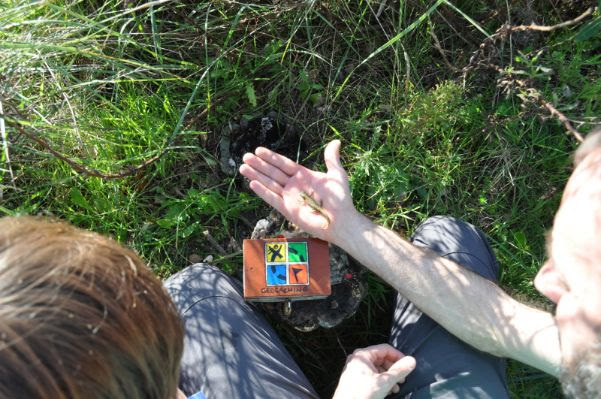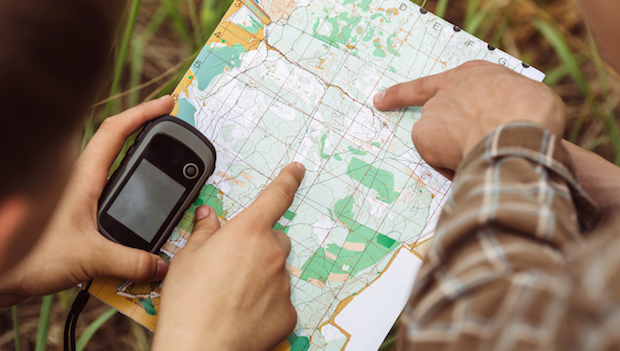Practitioners of geocaching, the world-renowned game of outdoor treasure hunting, show that they prefer open landscapes with water in Portugal – and, among forest landscapes, the cork oak forest emerges as the favorite.
These are the results of a scientific study that has now been published in the journal Ecological Indicators, which uses geocaching for the first time as an indicator to assess the cultural services provided by ecosystems: services that are difficult to measure, little studied, but fundamental in the process of defining more effective management and conservation strategies.
There are many ways in which ecosystems contribute to our quality of life. In addition to tangible resources and services – such as food, water and materials, among others – our interaction with nature also brings us equally important non-material benefits.
Recreation and cultural, spiritual and aesthetic enrichment – the so-called cultural services provided by ecosystems – lead us to establish strong emotional ties with the landscape. This cultural importance of ecosystems is difficult to assess and, therefore, little studied, but a fundamental aspect from a conservation point of view.
For the first time, a team of Portuguese researchers determined the preference for different landscapes using the geocaching database: a treasure hunt game in which participants (geocachers) search for small containers or objects (caches) with the help of a GPS or mobile phone.
Once the cache is found, players register their activity on the official website, being able to write, add photos and assign a score to the treasure search experience. In Portugal, there are currently more than 51 000 geocachers.
“The results indicate that there is no preference for any type of landscape when geocachers plan their visit – their main motivation is the adventure of searching and the enthusiasm of finding it, with respect for nature being highlighted. However, once on site, we found that geocachers prefer open or watery landscapes, followed by forested landscapes”, explains Inês Teixeira do Rosário, postdoctoral researcher at the Center for Ecology, Evolution and Environmental Change – cE3c, at Faculty of Sciences, University of Lisbon, and first author of this article.
Among the forested landscapes favored by geocachers, the cork oak stands out, a landscape of great economic and socio-ecological value for Portugal. “Given the value that the cork oak forest represents for the country, it is important to have studies that also prove its cultural importance, which is more difficult to quantify”, explains Inês Teixeira do Rosário.
“Considering the difficulties that this ecosystem faces, such as tree mortality, it is also important to realize that there are other activities compatible with the existing ones that can help managers in their conservation”, he adds.
Until now, geocaching has not been used for this type of approach, and it was the fact that this database contains not only photographs, but also texts and ratings given by geocachers, that led researchers to explore this method to assess cultural services. provided by ecosystems.
Through collected data on the portuguese geocaching forum, the researchers verified in which landscape types the more than 35 000 active caches were found in mainland Portugal at the time of the study, at the end of 2016 (currently, this number rises to around 40 500).
They also calculated the frequency of visits to the caches, as well as the total number of photographs, and analyzed the votes and the extent of texts posted by the players after finding the caches, depending on the type of landscape - which revealed a preference for open and with water and, among the various types of forest, by the cork oak forest.
“These results indicate that various types of landscapes, including cork oak forests, are important for those who enjoy outdoor activities, and that these activities should be taken into account in land use planning and property management”, concludes Inês Teixeira do Rosário .
This study is the result of collaboration between researchers from the Center for Ecology, Evolution and Environmental Change (Sciences ULisboa), the environmental consultancy company Bioinsight, the Center for Forestry Studies (Instituto Superior de Agronomia – ULisboa) and the Interdisciplinary Center for Social Sciences CICS. NOVA (New University of Lisbon).
Article reference:
Rosário, IT, Rebelo, R., Cardoso, P., insured, P., Mendes, RN & Santos-Reis, M. (2019) Can geocaching be an indicator of cultural ecosystem services? The case of the mounted savannah-like landscape. Ecological Indicators, 99, 375-386. DOI: 10.1016/j.ecolind.2018.12.003
Author CE3c Communication Office – Center for Ecology, Evolution and Environmental Change
Science in the Regional Press – Ciência Viva
Learn more about Geocaching in Portugal by clicking here.




















Comments